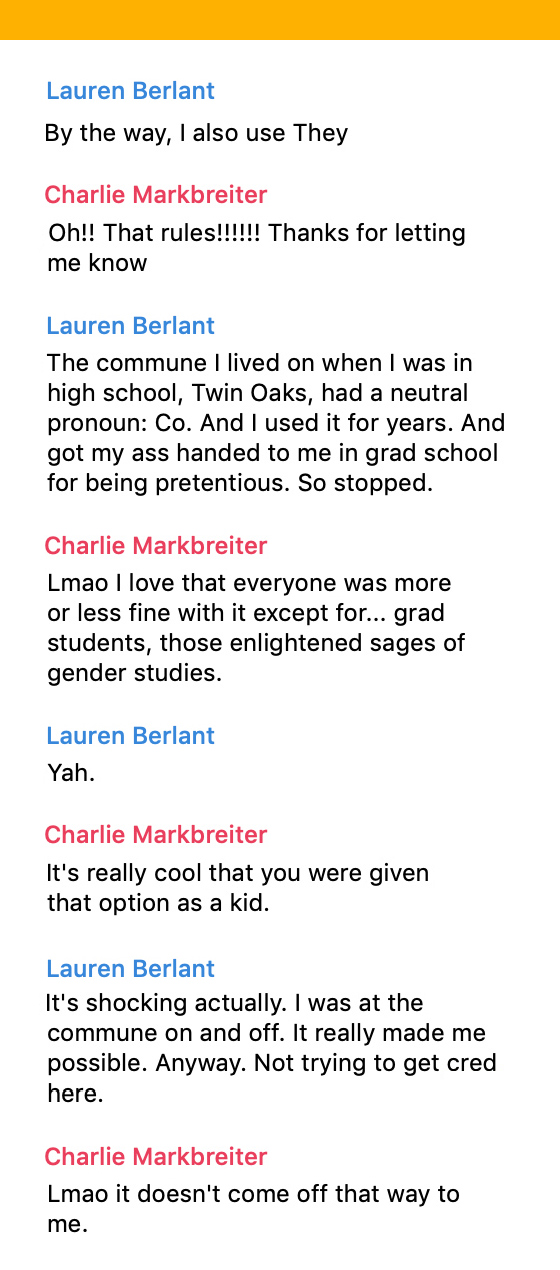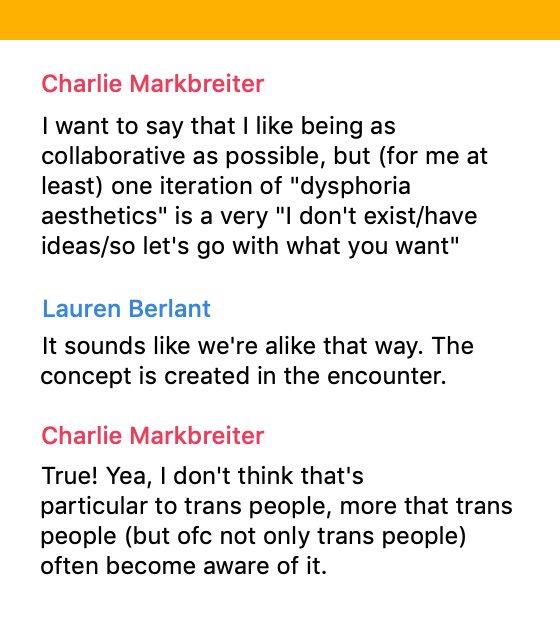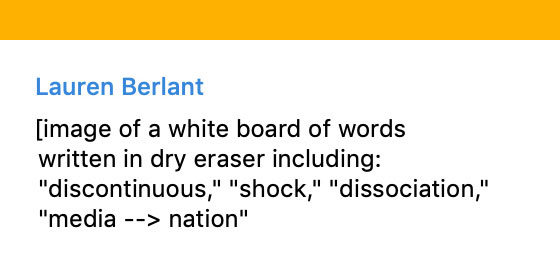For alt-right edgelords (Jordan Peterson), “centrists” (Glenn Greenwald, Aaron Sorkin), and conservative pundits, Something is Wrong, and that Something is sometimes the nonbinary scammer. Typecast as a white college undergrad, although such a thin demographic excludes most nonbinary people, this figure threatens scarcity economics. Instead of taking government money, however, the nonbinary person demands attention. Oppression, in this case transphobia, is thus reconfigured as pleasure. The nonbinary person wants to be oppressed, according to this logic, because oppression gives them attention: magazine covers, op-eds, trending hashtags—all forms of currency in an attention economy. The problem here is not that white, upper-class Americans are extractive but that their kids went to college and contracted gender. We all might want attention and sometimes also an Event, singular and severe, around which our banal, self-blame-y immiseration could suddenly cohere, but it’s easier to believe that only some trans grifters do.
Part of the scam, at least according to Kill All Normies author Angela Nagle, is that trans people aren’t funny, proving that Angela Nagle has never met a trans person. They can’t make or take a joke, she argues, as if assimilation into the social body depended on your sense of humor. Perhaps it does. In an interview in the Point, Lauren Berlant defines humorlessness as “the sudden withdrawal of a cushion in a social relation, the sudden experience of the intractable where you thought things were tractable . . . This is why there’s a lot of humor in anti–politically correct discourse.” Why are p.c. debates so unfunny, but also so funny, and why did these charges of humorlessness stick to trans people in particular?
My aim was to interview Lauren, but they couldn’t get my emails. I’d message, asking about their preference for interview format, and they’d email me back a few days later, asking why I hadn’t responded to the email they’d sent a week prior. My tweet drafts from that week (now auto-deleted) read, “My HERO thinks I’m an IDIOT!!!” I hoped the miscommunications could be pummeled into lyrical/experimental auto-fiction. I told Lauren that my Twitter handle was @BerlantBro, which embarrassed us both. “Back to reading about trauma,” they said. As the possibility of successful email communication dripped away, we proliferated onto other platforms: Gchat, Google Doc comments, a Google Doc chat, which then got deleted because Google Docs doesn’t auto-archive. These inserts have been belatedly tacked into the margins. Lauren would call them “comedic asides.” Lauren would also say “there are no true asides.”

•

LAUREN BERLANT.— If you could see me sitting here, you’d see a cup of tea, a glass of water, two pair of headphones (one for transmitting noise, one noise-canceling), my leg elevated in a brace that’s also holding in place an ice pack. The procedure is called RICE: Rest, Ice, Compress, Elevate. Somewhere in the tableau you’d see included a face, a body wearing black, and typing hands. The face and hands are swollen from unrelated medication. In the body/mind relation slapstick remains the dominant genre. We’re loosely connected to ourselves, as likely to be out of sync in one place as in sync in another. Movement involves disturbance and the shakeup or breakdown of form, signaling what in life can’t be controlled.
You, Charlie, had said that our conversation glitchfest was “humorless comedy,” and I said, no, I didn’t think so, but that it was the slapstick of ordinary relation, insofar as we were trying to stay in the same enough conversation in order to build something together that neither of us could build by ourselves. When we look at the cinema of slapstick, the copresence of building and unbuilding the relation of subjects and objects (other persons, things, worlds) can be funny, tragicomic, anxious, and pleasurable, all at once. We were both anxious. We’re calmer now.
What made our efforts to stay in synch comedic? It certainly didn’t feel funny. Perhaps this is a way to start speaking about comedy and anxiety.
That’s because we were trying to find a reliable way to respond to each other. Sincerity is often funny, if it comes from a desire to self-idealize or get things right. But, if I can distinguish the comedic from comedy for a moment, the failure of the body to respond to intention is at the heart of physical comedy. Spontaneity is a threat to one’s treasured notion of reason, sovereignty, boundary policing, and world-image: As Linda Williams argues in her essay “Film Bodies,” which isn’t about comedy, the genres that produce spontaneous affective bursts like Horror, Porn, and Melodrama all give a tone to the lack of fit between subjects and worlds, a tone of excitement at once alluring and aversive. This is true about the comedic too—but the anxiety at mere incongruity or jumpy relationality is tilted toward affirmation of the attachment to life, and also, in contemporary comedy, to being able to bear the work it takes to keep affirming the attachment to life.
I think these questions about comedy and anxiety are all bound up in the contemporary (Western, cosmopolitan) moral test that the pleasures of comedy are being exposed to: whether it’s possible for spontaneous pleasure to be governed by ethics. There’s so much fear of making mistakes and inducing an irreversible fate. Much the same kinds of pressure are endemically placed on sexuality.
That reminds me of Andrea Long Chu’s essay “On Liking Women,” in which she writes, “Nothing good comes of forcing desire to conform to political principle. You could sooner give a cat a bath. This does not mean that politics has no part to play in desire. Solidarity, for instance, can be terribly arousing.”
David Halperin argues in What Do Gay Men Want? that genuine spontaneity in spaces both of desire and sexual practice requires bearing non-sovereign relationality. Foucault argues for this too, in “The Politics of Friendship” and elsewhere. Fred Moten describes this problem in Levinasian terms as “entanglement,” an a priori exposure of a community to itself.
That’s what Andrea Long Chu is commenting on, too. “Ethics” comes into how people frame the situations they’re making, but once you’re relating to others and worlds, you aren’t in control of the frame. You can only be a version of the being you respect. But frame shifting and frame breaking (or mere missing the point) are inevitable once you’re building worlds with others. This non-sovereign relationality is what my next book, On the Inconvenience of Other People, addresses. It’s also a central technique of the comedic. So we would need to think of a distributive ethics involving a collective attention to serving, deserving, being prepared for relationality—to its slapstick, and the weird valences of intimacy and alienation that come from moving through the world together.
What is non-sovereign relationality?


Yes, or a desire. “Fantasy” is not just a thin wish but a logic that names a value.
It seems like a lot of the work of maintaining the feeling of sovereignty stems from a relationship to contingency: which kinds feel good or bad, how much is too much.
Right. A few other things. One: In my work on humorless comedy, the protagonists are all committed sovereigns who need things to appear a certain way. Humorless comedy is a comedy of compulsive sovereignty. The texts are Scorsese’s The King of Comedy, Colson Whitehead’s “The Comedian,” and Lisa Kudrow’s The Comeback and Web Therapy, all brilliant. The comedy they generate involves the spectacle of a radical willfulness that generates disaster after disaster, like a Road Runner cartoon. The works are barely comedic because the protagonists insist on bringing down any person or world that threatens their ambition. The pleasure of the text is comedic because technically, as spectators, we are on the side of the protagonist’s humorless ambition to pursue the pseudo-self-transcendence of a celebrity status. This of course links humorless comedy to Trump and many phantasmatic sovereigns.
But humorless comedy protagonists are not all alike, because they have different relations to the truth of the costs of their ambition. They also want to maintain the comedian’s historical obligation to be the fool who tells the truth about the ordinary injuries, anomalies, absurdities, and impediments of life.
The second thing is that in "Comedy Has Issues”—our introductory essay in Critical Inquiry’s Comedy: An Issue—Sianne Ngai and I write that comedy is the scene of testing out the relation among pleasure, authority, and judgment. But insofar as it produces pleasure that feels like pleasure (even mixed) in the scene of testing it is still comedy. This is why, despite Hannah Gadsby’s claims to the contrary, Nanette remains a comedy, because it is a test of what kinds of observation, surprise, storytelling, lack of fit, insider knowledge, and solidarity the audience will go with on behalf of the jester’s higher truth.

In your interview with the Point, you mention your research on the humor and humorlessness of our current p.c. debates. You argue that when the term “PC” was first introduced “being PC was a reminder that your visceral responses were not justice. Of course, all of us are trained as modern subjects to think our visceral responses are justice. But they’re not.” I’m curious as to why trans people have, for the right and liberals, emerged as exemplars of humorless p.c. culture (at least according to people like Angela Nagle, Jordan Peterson, Chris Castiglia, and Chris Reed’s recent LARB piece.)
The book on humorlessness has three chapters: on politics, on comedy, and on love. The politics chapter originates the claim that humorlessness is not just a visible performance—of crossed arms, a hard face, a flat voice—but also the expression of what’s intractable in relation. (Did you see how the Google autocorrect transformed “unmoveable” to “unloveable”?!).
The argument of that project is that one’s structural location in hierarchies of difference and value shape the consequences of being seen as humorless. If you already have structural power your humorlessness increases your value and your power, and if you seem beneficent (a nice cop or boss or teacher, say) then you seem even more so, because structurally you are humorless, and just decided not to force your interlocutors (your neighbors, loved ones, workers, clients, whoever’s exposed to your judgment) to submit to your will.
Meanwhile, the privileged demand that the less privileged not be humorless. This links my humorlessness argument to Sara Ahmed’s argument about the feminist killjoy. As she says, the person who names the problem becomes the problem. And if the person who names the problem is a kind of subject like a feminist, a person of color, a politicized queer, or/and a trans person, the privileged devalue them because they’re used to being deferred to and not tortured by a refusal of recognition.
So, trans people are cast by some of the people they’re inconvenient to as inappropriately demanding, as in: How dare anyone outside the current settlement of normative social life demand to be the referent and to inconvenience other people’s casual relation to language, nature, taxonomy, gesture, and concept?
Even the smallest claim, such as not to be addressed by one’s state-sanctioned name and the pronoun conventionally attached to it, has been called “too much.” Bah.
Politics exists wherever we’re inconvenient to the reproduction of normative life, the conventions and institutions of that life. A lot is at stake even in the most specific of demands. That’s why the affect around politics-from-below is so high, and why call-out culture is so dramatic. Change is hard, and the recasting of the ordinary—of intuitions, visceral responses, and concepts of life—takes a long and slow time. For the people who don’t want to have to fight for baseline inclusion in the general imaginary, these demands are urgent. They feel like the difference between 0 and 1 of acknowledgment and truth really matter, and thus a certain humorlessness accompanies their claim about other people’s obligations to cultivate a more capacious, antiauthoritarian, revolutionary consciousness.
I’ve been schooled by Arendt’s work on forgiveness in The Human Condition, and I think about it a lot. She argues that since you can’t unsay what you said, or not do what you did, there’s no going back and erasing the event. But sometimes we still have to figure out ways to move together, in the process of shaping and keeping the vitality of solidarity. That claim on forgiveness is different from forgetting or letting things go. I find her version of that obligation a high bar affectively and politically, and a guide for my own processes of defensive and aggressive ideation when I feel the persistence of a threat to my own and my allies’ flourishing.
Your comments really help clarify why marginalized people are accused of, for instance, thinking that they’re “so special,” even when they make a small demand (e.g. for correct name and pronoun usage). That is: You must think you’re special, because only those with power are “allowed” to be humorless, thus you’re assuming something that isn’t “yours.” I Googled “pretentious”—another charge that trans people are frequently accused of—and the auto-generated definition was “attempting to impress by affecting greater importance, talent, culture, etc., than is actually possessed.” So there again, you’re seen as assuming the right to something that you don’t, in their view, possess. As being “special” becomes increasingly integral to financial and emotional survival under neoliberalism, then it’s no wonder that those seen as . . . I don’t know, sauntering in and grabbing specialness off the counter instead of working for it or being “born that way” are felt to be so threatening.


In other words, the scathe against specialness ties back into what we discussed earlier in this interview, which is that under authoritarian and supremacist regimes one is supposed to earn the right to exist rather than to be respected and cultivated because they exist. The entrepreneurial subjectivity of neoliberalism that leaves each subject the “right” to game the system indefinitely because there is no foundation but only movement (as Deleuze says, neoliberalism makes new prisons as well as new freedoms) is just one phase of this virulence against specialness. The people who identify with power whether or not they have it don’t want anything to come easy to anyone—it’s a democracy of vulnerability, exposure, and the desperation of the constant hard work of staying afloat and attached. It’s heart- and potentially world-breaking that these are the signs of democracy for them: To them, to be special is a privilege.
Meanwhile, movement cultures loosely and tightly organized are not for the most part claiming to be special. They are demanding the destruction of the violence that has become so ordinary that people shrug at inequality as just one more thing.
Why are there no true asides? I just looked up “aside” on Wikipedia, which said, “An aside is, by convention, a true statement of a character's thought; a character may be mistaken in an aside, but may not be dishonest.” So (and correct me if I’m getting this wrong of course!) true asides are thus impossible because the the kind of alignment (between statement intention and audience reception) that would correspond to “truth” is never assured?
You can’t control how other people process your statements. What you think is casual or spontaneous or light might feel like a weight or a weapon; intention is just one factor. Our whole conversation has been about this!
I can’t escape feeling like there’s more that you wanted from this interview, more that I should have done or said, but I think that’s my own spiral that I will have to be OK with. Maybe this is a weird thing to say, but being a well-known academic seems like a weird position to be in, in a way—you’re somewhere between a therapist and a prophet. People want the answers to Life, but also they want the answers to their own Life, and, of course, no one person has either. I apologize for placing that kind of weight on you, or on our conversation lol. As in—there is nothing to add, but because I worried you might want me to provide (or to help you provide) EVERYTHING (as if such a thing could exist! In an interview!!!!) I’m worried that there is more that is being left out.
In a way that’s why there are no asides, because people are looking hard for something from anyone who’s sustaining a thought, a pedagogy, an orientation toward resistance and attachment to life. This is why my epitaph is, “She did what she could do at the time” (The Hundreds, 97).
